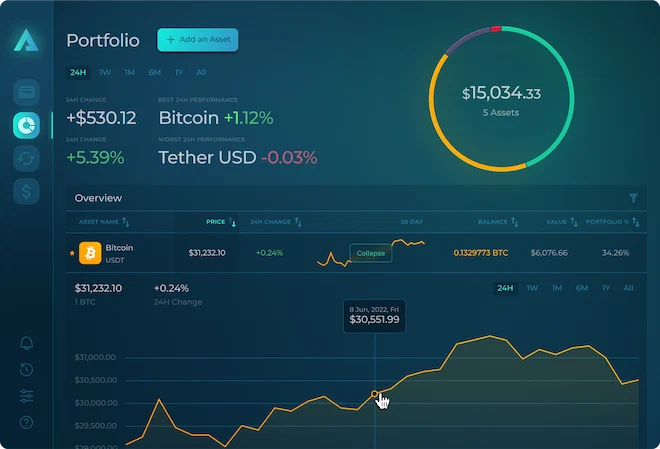All About Crypto Wallets: Beginner's Guide
Nov 7, 2022Cryptocurrency has become a part of the financial system. Nowadays the most important request of crypto users is to have “everything in one place” and the ability to manage their funds “at any time”. And the crypto wallet can cope with this deal.
What is a crypto wallet?
A crypto wallet is a piece of hardware or software that interacts with blockchains and allows you to store or trade various types of cryptocurrency. You can buy, sell and store crypto there. Many crypto wallets also provide such useful features as Built-in Exchange, Portfolio, Address Book, Full Transaction History that helps to keep an eye on your investments and the crypto market.
How do cryptocurrency wallets work?
Crypto wallets are divided into two general groups: software and hardware. Although their functions are different, their main goal is to securely access any cryptocurrency you hold.
In fact crypto wallets don’t hold any cryptocurrency, only the information about the public and private keys to carry out transactions. The cryptocurrency itself is stored on a blockchain.
What is a public key?
A public key verifies that you are the owner of a public address that can make transactions with cryptocurrency.
What is a private key?
A private key is like a password for a crypto wallet. It allows users to access their wallet to buy, sell, and monitor their assets.
| Source: Arctic Wallet |
Types of crypto wallets
There is a variety of crypto wallets, but they all can be divided into two main types: hot wallets (digital) and cold wallets (physical).
| Source: Arctic Wallet |
Cold wallets
Cold wallets are physical tools for keeping information about cryptocurrency. These can be a paper wallet or a USB drive that lets you make any transactions when they are used on a computer.
As such wallets store all the information offline it makes them more secure because they are less likely to be accessed online by hackers.
Cold wallets commonly fall into hardware and paper wallets.
Paper Wallet is a piece of paper that contains all the data you would need to access a cryptocurrency address. Cold wallets generally offer additional security from malicious attacks.
Hardware Wallet is a wallet that connects easily to a computer or any other device by using a USB drive. Even if the device is connected to the Internet, the private key is secure.
Hot wallets
Hot wallets are pieces of software, you can’t hold such a wallet in your hands. The great advantage is greater convenience for crypto traders.
Hot wallets can be:
- Desktop wallets
- Mobile wallets
- Web wallets
Desktop Wallet is an app that is downloaded to a desktop or laptop computer. The application will help in generating a data file for holding the keys of the users. Such a wallet is easy-to-use, ensures privacy and anonymity and doesn’t require the participation of third parties.
Mobile Wallet is functionally similar to a desktop wallet. You need to install a mobile app on the phone, and then use it as a wallet. These wallets have quality-of-life features such as QR codes for transactions. That’s why such a wallet is suitable for daily operations.
Web Wallet is a website that provides an interface to access your cryptocurrency from any location with your password, a device, and a web browser.
How to choose the most suitable wallet for you?
While choosing a cryptocurrency wallet, pay attention to such things as:
- Cost. Is the cryptocurrency wallet free?
- Security. How does the company provide security of the cryptocurrency wallet?
- Mobility. Is the cryptocurrency wallet accessible at any time in any place?
- Easy-to-use and user-friendly design. Is the cryptocurrency wallet intuitively understandable?
- Convenience. Can you keep in one wallet all the cryptocurrency you need? Is it possible to make a fast purchase?
If you need a combination of all these features take a look at the desktop wallets.
The advantages of desktop wallets:
- Reasonably secure storage of cryptocurrency
- Accessibility and usability
- Your private keys are not stored on a third-party server
- Support a wide range of assets
- Provide additional features like portfolio or address book
Desktop wallets are known to be reliable for many crypto owners. Let’s compare some of them.
Overview
| Source: Arctic Wallet |
Supported Assets and Chains
Newer wallets usually offer a smaller variety of chains and assets compatible with their product. Arctic Wallet and StrikeX, being very recent to the market, have 25 and 12 blockchains supported respectively. Yet, such wallets have a huge potential to grow on. Such industry giants as TrustWallet and Exodus have a lot more to offer thanks to their extensive user base and the long road to reach that. However, the number of assets is not the only criterion to consider when choosing digital storage. Let’s discover more!
Utility / Functionality
Crypto wallet today is much more than mere storage for your asset. It is becoming a full-fledged tool to manage your funds and access all DeFi world's products.
For example, Exodus and StrikeX wallets support WalletConnect to smoothly interact with dApps. StrikeX is currently adding price-change alerts to the app. TrustWallet provides decent staking to earn passive income for holding cryptocurrency - currently, you can stake BNB, Cosmos, Terra, Tezos, and a few other coins. Arctic Wallet has a convenient in-built exchange option offering the best rates and affordable fees.
Fees
Transaction fees
As a rule, cryptocurrency wallets do not hold any fees for their service, as, generally, that is not how they profit. All the fees go directly to miners and networks.
Some cryptocurrency wallet providers have a flexible solution, where users can adjust fees. The speed of any transfer depends on a fee - the higher it is, the faster it gets processed by the network.
TrustWallet allows fee customization so that users can increase or lower the fee depending on how fast they need the transaction to be done.
Exodus opts to set higher gas fees to ensure faster transactions. However, this feature is customizable for ERC-20 and BTC only.
Arctic wallet allows fee customization so that users can increase or lower the fee depending on how fast they need the transaction to be done.
Exchange Fees
Aside from sending, receiving, and storing cryptocurrency, many wallets provide exchange functionality. However, these swaps and purchases are often performed by third parties, thus, there is a demand for KYC. Troubleshooting in this case is also done via providers, not the wallet.
StrikeX enables frictionless cross-chain swaps in integration with Rubic.exchange, charging a modest 0.3% along with the network fee, which reportedly funds further app development.
An in-built DEX of Exodus has a limited number of supported chains: Ethereum, Solana, Polygon, and BSC. Also, Exodus sets minimums on trades that may cause inconveniences. For instance, you can exchange a minimum of 8.8M Shiba Inu coins with Exodus.
Arctic Wallet utilizes a complex approach, as it searches for more attractive rates on the market to perform the exchange. There are two types of rates available - best rate and fixed rate. The best rate ensures that you receive the most fruitful offer, while with the fixed rate you get the exact amount you submitted.
While exchanging from the wallet, bear in mind that it includes service fees and network fees for sending funds from your wallet to exchanges and back.
Purchase fees
All the wallets we review offer buying crypto with a debit or credit card. Exodus integrates Ramp and MoonPay for that purpose. Ramp supports 27 cryptocurrencies and charges around a 5% fee, KYC is also needed. MoonPay fee is about 4% + network fee paid additionally.
From TrustWallet, you can buy crypto with Binance Connect (1-2% + network fee + KYC), Mercuryo (fee around 4%), Transak (7%+ network fee), and Ramp (4% + network fee). TrustWallet’s minimum for transactions is $50. It also holds an additional 1% for exchange operations, which can be eliminated by holding 100 Trust Wallet Tokens.
Arctic Wallet partners with Mercuryo to perform purchases directly from the app. Thus, standard Mercuryo fees apply with no additional service fees from Arctic.
StrikeX also integrates Mercuryo payments with an additional 1-2% fee on top of Mercuryo standard fees.
Customer Service
Crypto storage providers often fail to deliver high-level customer service due to the decentralized nature of the product. As a rule, there are FAQs and Self-Help articles to solve any common issues.
TrustWallet is known for almost lacking support, as it may take weeks to receive a reply. Exodus is doing a good job with online chat, yet, some customers note long response times. Arctic Wallet’s response time is about three minutes. It also has additional channels to reach out and solve any issue, as well as ask any questions concerning the app.
StrikeX so far lacks in-app support chat, yet, the team is reachable and responsive from the browser.
Conclusion
Here we go with the most important information to be considered before choosing the wallet. Always remember to do your own research on all the details prior to deciding which wallet to trust. Follow the updates of your select wallets as the DeFi industry is moving too fast to catch up. Enjoy navigating the crypto world, it’s full of wonders!


